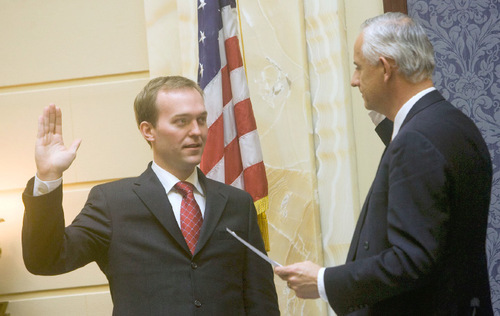This is an archived article that was published on sltrib.com in 2010, and information in the article may be outdated. It is provided only for personal research purposes and may not be reprinted.
Frustrated that Utah continues to be seen as the nation's fraud capital, state Sen. Ben McAdams is proposing a web of bills designed to crack down on scam artists.
The Salt Lake City Democrat, a securities attorney with a Wall Street background, is tired of seeing fortunes ransacked, houses lost and families ruined by hucksters.
The FBI, he noted, is investigating $1.4 billion in fraud cases in Utah alone.
"Our fraud industry is double the size of our ski industry," McAdams said. "That's troubling."
Just this week, state investigators charged a South Jordan man with ripping off the widow of a victim in the Trolley Square shooting spree by swindling $250,000 of her husband's life insurance benefits.
McAdams plans a package of four bills. One would strengthen penalties for defrauding a vulnerable adult such as someone with dementia. It also would expand the scope of felony penalties for so-called affinity fraud to include relationships of "special trust," including relatives, religious leaders, landlords, employers and doctors.
A second measure would reward whistle-blowers. A third would expand the fair-credit act to apply more broadly in mortgages to protect consumers. A fourth would be Medicaid related, allowing private litigation against health providers who bill for services they never provide, such as wheelchairs or crutches.
McAdams touted the legislation Wednesday during a Business and Labor Interim Committee hearing. The Utah Division of Securities, he said, backs the measures.
Sen. Gene Davis, D-Salt Lake City, warned the state must be careful on the Medicaid front not to criminalize providers for simply forgetting to "dot an i or cross a t."
"There's got to be intent," Davis said.
McAdams said the legislative auditor general projects stricter scrutiny of health providers could save the state $6 million a year.
The senator emphasized he is not targeting multilevel-marketing endeavors common in Utah County.
"They are for all legal purposes, good corporate citizens," he said in an interview. "Many of them are legitimate Utah businesses. It's my hope that we can separate the wheat from the chaff."
Even though a handful of high-profile fraud probes have netted neighborhood LDS leaders, McAdams, who is Mormon, wants to steer clear of a religious crusade.
"I don't want people to think I'm going after Mormon bishops," he said, "but, with religious leaders, it happens."
His proposal would assign a second-degree felony for fraud toward any such trusted relationship.
Sen. Wayne Niederhauser, R-Sandy, worries about clogging the books with redundant fraud laws, but said he is open to new ideas. And he doesn't deny Utah has a fraud problem.
McAdams conceded plenty of laws already address fraud, with penalties spanning the felony spectrum, but noted Utah still has a rap nationally for being a fraud capital.
"We can be better than that," said McAdams, who also teaches securities law at the University of Utah's law school. "We pride ourselves on being a very entrepreneurial state. But think about the people who have provided for themselves and have had their retirement or homes taken?"
McAdams pointed to a Utahn who lost her house to fraud then died homeless.
During his tenure in the Legislature, Salt Lake City Mayor Ralph Becker recalled another egregious case that proved "extremely difficult" for the victim to right the wrong.
"It seemed like the laws weighed against this person's pursuit," Becker said in an interview. "There's no question this is an issue we should all be concerned about. I commend Ben for bringing those forward."
McAdams also works as a senior Becker adviser.
"These issues are so important," Sen. Karen Mayne, D-West Valley City, told the committee. "I have had two in my Senate district where people of trust have perpetrated some really stinky things on people. Some of them had 401(k)s where they lost money."
Under review
P State Sen. Ben McAdams' series of anti-fraud bills are being reviewed by lawyers and fiscal analysts.



